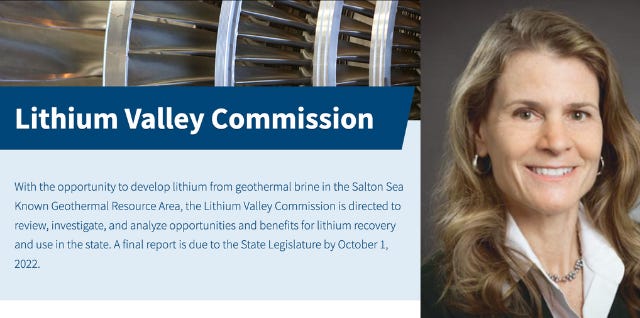Issue 11: Lithium Valley Commission fills vacant seat
Alice Busching Reynolds, president of the California Public Utilities Commission, joins the 14-member blue-ribbon commission on lithium in Southern California.

Fresh this Week
CPUC President Joins the Lithium Valley Commission
Alice Busching Reynolds, president of the California Public Utilities Commission, was recently added to the state’s blue-ribbon group tasked with studying the impacts of lithium in Southern California. The CPUC is the state’s regulatory body that oversees utilities like power, natural gas and water.
The seat had been vacant since at least December when Martha Guzman Aceves, the CPUC’s former commissioner, was chosen to become the head of Region 9 of the federal Environmental Protection Agency.
Want to join the discussion on developments of the Lithium Valley? Join the Facebook Group and subscribe to this newsletter for a fresh batch of news every Friday.
Lithium Valley Commission Struggles with Funding and Pace
The state’s blue-ribbon commission on lithium in Southern California is less than five months away from turning in its final legislative report to the state on October 1. And the commission appears to be sluggishly moving towards that goal, The Desert Sun reported last week.
A few important details to note in that story:
Halfway through the year, the commission has produced no draft and has taken little formal action. It has not even approved the minutes of several previous meetings, which typically run for four hours or more.
Members of the commission are volunteers and the body has no funding from the state to do its work.
Despite there not being any Imperial Valley-wide community meetings, Imperial County board supervisor Ryan Kelley says there is a community-based county task force that holds regular monthly meetings in Niland.
And, finally, Silvia Paz, the commission’s chair, said at a March meeting that she could not support anything that would streamline or otherwise avoid full environmental reviews for each project, which is what Imperial County officials want.
The last point is important to make because the commission intends to discuss Imperial County’s lithium economic plan in its upcoming meeting on May 12. Its previously scheduled meeting was abruptly canceled due to a lack of participation from most commissioners.
EnergySource Announces New Investment
EnergySource, one of the three companies seeking to extract lithium from the geothermal brine in the Salton Sea, says it has received a new round of investment led by Schlumberger New Energy and TechMet Ltd.
The two companies specialize in investing in new carbon-neutral technologies and lithium-ion. Though it did not say how much money was raised, EnergySource says that this new round of investment is a “strategic partnership to accelerate the deployment of the ILiAD lithium extraction platform.”
EnergySource has said time and time again that it possesses the most advanced and greenest technology to extract lithium from geothermal brine, but some experts have expressed skepticism. EnergySource did not respond to my repeated requests for comment or to answer more questions about its project.
Lithium Taxes, Skepticism Discussed at Imperial County Board Race Debate
Candidates running for Division 5 of the Imperial County Board of Supervisors touched on the topic of lithium, how it may be taxed and whether history will repeat itself.
County supervisor Ray Castillo reiterated a claim that Imperial County sits on a reservoir of 15 million tons of lithium below the Salton Sea and that it is “probably” worth $1 trillion, The Desert Review reported.
“As far as taxation goes, I think we’ll leave that up to the state and we’ll be communicating with the state to make sure we get our fair share,” Castillo said at the debate, which included his opponents, Carlos Zaragoza and John Hawk.
Hawk expressed caution, saying: “We have to be very careful and very judicious about what we do with lithium and who puts their money and company behind it.”
He added: “A lot of times we look (for) jobs, jobs, jobs … and we don’t do our investigative work. I think that’s exactly what happened with solar and that could happen with lithium. We need to be wise before we put money — county money, your money, and my money — in a project that is not totally proven.”
Zaragoza had a different view, saying that he does not support heavily taxing lithium companies because they will pay in property taxes.
Movements to Watch
The Lithium Valley Commission’s next meeting will be held online and in person at Imperial Valley College on May 12. Among its agenda items is its formal introduction of Alice Busching Reynolds joining the commission and discussion of Imperial County’s lithium economic plan.
Want to join the discussion on developments of the Lithium Valley? Join the Facebook Group and subscribe to this newsletter for a fresh batch of news every Friday.



